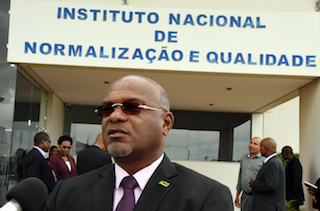Paratus Mozambique to exhibit at the Mozambique Gas & Energy Summit
Mozambique: Industrialise to boost exports

Photo: A Verdade
Industrialisation, in order to improve exports, should be one of Mozambique’s main priorities. This is to be achieved through the ́promotion and creation of new industrial units with the potential to produce quality products on a large scale, not only for the satisfaction of the domestic market, but also for improving export levels.
Mozambique’s export levels are extremely low at the moment. For the Minister of Industry and Trade, Carlos Mesquita, this cannot continue, given the country’s many resources, especially its fertile land and prime conditions for sustainable production.
The Minister of Industry and Trade advanced this position in Maputo on Monday (24/2) during visits to the institutions under the supervision of his ministry, where he reminded workers in various sectors that “according to the challenge laid before us by the President of the Republic, we need to accelerate the industrialisation process”, to, in the short to medium term, minimise Mozambican imports and improve the level of exports.
“We want our trade balance to register more exports than imports. We want to cross borders, because at the moment we are not happy with the levels of trade balance,” the minister insisted.
Carlos Mesquita says that, for this industrialisation process to begin, an inventory of the industrial sector will first have to be carried out to determine the number of existing units and their problems and expectations. A national industry development plan will then be relaunched, focusing on the development of agriculture.
The minister’s visits covered eight institutions: the Agency for the Promotion of Investment and Exports (APIEX), the Mozambique Commodities Exchange [Bolsa de Mercadorias de Moçambique (BMM)], the Mozambique Grain Institute [Instituto de Cereais de Moçambique (ICM)], the National Directorate of Industry (DNI), the Industrial Property Institute (IPI), the National Inspectorate of Economic Activities (INAE), the Institute for the Promotion of Small and Medium Enterprises (IPEME) and the National Institute for Standardisation and Quality (INNOQ).
The minister told officials of the supervised institutions that industrialisation is part of one of the four pillars in the present five-year mandate, in line with the regional and continental integration plans.
“In this way, we will encourage business initiatives aimed at revitalising and modernising agro-industries, agro-chemicals, textiles and clothing, metal-mechanics and building materials industries,” Minister Mesquita said, advocating more youth employment in the country, alongside the reduction of development asymmetries and the trade balance deficit.













Leave a Reply
Be the First to Comment!
You must be logged in to post a comment.
You must be logged in to post a comment.